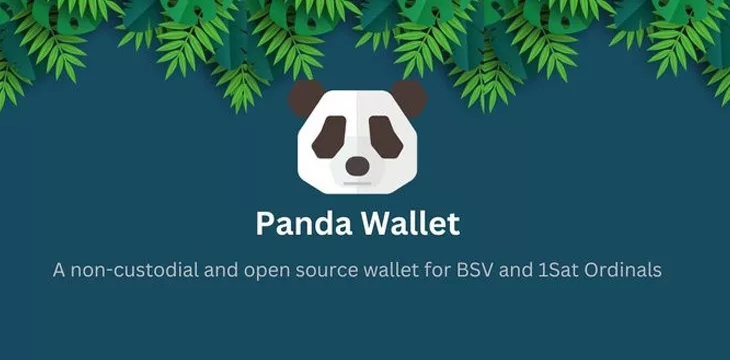
|
Getting your Trinity Audio player ready... |
Haste Arcade Co-Founder Dan Wagner open-sourced a non-custodial Web3 browser extension wallet with BSV blockchain and 1 Sat Ordinals support named Panda Wallet. The extension can be downloaded from GitHub and installed on Google Chrome. I caught up with Wagner to learn his motivation for developing the wallet and how he would like to utilize it.
Panda Wallet is a non-custodial and open source web3 wallet for #BitcoinSV.
What will you contribute?https://t.co/3gMBxTByxG
— Yours Wallet (@yoursxbt) October 7, 2023
Why did you build Panda Wallet?
Wagner: Two reasons mainly:
- A proper web3 extension wallet is one of the most requested products/services in the space and has been for years.
- The closest thing we’ve had was Sensilet (which no longer works).
How long did Panda Wallet take to develop?
Wagner: It’s kind of a tricky question. Technically speaking, it took me a couple of weeks part-time (staying up late on nights and weekends) to stand up for what I’d consider an alpha MVP. I would largely consider the feature set still in its infancy, though. You have to start with the basics. It will never be ‘done.’
Why did you open-source the wallet, as opposed to keeping the wallet as Haste Arcade branded IP, for example?
Wagner: There’s a lot of talk in the space about the importance of collaboration and collectively working on and for ‘Bitcoin.’ I have my private companies and believe private companies, in general, will continue to play a role in the world, even in a hyperbitcoinized world.
However, a non-custodial wallet feels like it shouldn’t have external dependencies.
Panda Wallet is built in such a way that it doesn’t need or require a trusted party to run. I don’t see this as ‘my project.’ I’ve simply made some initial contributions. I hope others do the same. Collectively, we can build something amazing.
Why do you think the BSV blockchain has not had a commonly adopted browser extension wallet to date?
Wagner: That’s a good question, and I’ve often wondered the same thing. I think if we’d seen a non-custodial web3 wallet that supported RUN FTs and NFTs, there would have been a good chance for adoption. Sensilet was doing its own thing with Sensible tokens.
I like Sensible and RUN in theory, but I think 1Sat Ordinals make more sense at this point. However, with Panda Wallet being open source, we’re a PR away from supporting RUN, Sensible, STAS, or whatever else people want to see.
Can you talk through the challenges of implementing secure messaging from a browser extension in the context of managing user’s coins and tokens?
Wagner: Given that everything is on the client, you have to rely on best practices regarding security. Encryption and password-protected methods for things that involve sensitive operations like decrypting user’s private keys are top of mind.
From a “messaging” perspective, sensitive data is never passed, and decryption is always isolated. Having said that, it would be prudent for the developers contributing to the project to bring in a security expert or, at the very least, have an internal and focused audit before coming out of alpha/beta.
What are your thoughts on locking coins and hodlocker.com?
Wagner: I love it. I don’t understand any arguments against it, to be honest. It makes complete sense, and I do not think it’s a fad. Whether Hodlocker is ‘the one’ or it’s something else, the idea of locking value to content sends a strong signal, and I think it can help with some of the incentive problems we’ve seen with things like Twetch.
Micropayments over data is great in theory, but the markets are signaling that they don’t care if their data is being mined more than their willingness to pay, even if it’s a penny. It feels like locking could potentially solve this incentive problem. I hope it does.
Will Panda Wallet be integrated into the Haste Arcade and/or Take It NFT?
Wagner: Of course. There are some interesting UI/UX challenges for something like Take It that we may need to address first. Specifically, user spend permissions are key and a reason I’ve always liked and continue to integrate HandCash for projects.
Enabling spend permissions so a user doesn’t need to ‘approve’ the request each time is essential in some applications. I’ll need to think through the possibility of securely doing this without the need for a backend.
In the Panda Wallet Discord, you mentioned starting a GitHub sponsors page for fundraising. What about doing Panda Wallet-themed NFT collection(s) instead?
Wagner: I think we will potentially see both. My vision is to see open-source developers contributing to Panda Wallet full-time. The only way to do that is through community support and real sponsorships. I’m not talking about raising a few grand from an NFT drop. I’m talking about real support to help grow a much-needed product/service that gains people’s trust. Every other noteworthy blockchain funds its developers and important things like wallets through sponsorships or grants. It’s time we do the same. So many people are passionate about Bitcoin, and we need passionate people full-time.
All funds will go to an Open Collective that has been created, so there will be full transparency on any allocation of funds. Developers deserve to get paid for their work. If you are not rewarded for your time, you will not stay around. I want to see Panda Wallet and BSV blockchain thrive.
What would you like to see built with Panda Wallet?
Wagner: Everything. It can support listing, locking, sending, signing, bsv20, NFTs, smart contracts, markets, etc. The sky is the limit.
The Panda Wallet Provider API makes integration into other web applications simple.
With some of the top developers in the space already working behind the scenes on this project, the real question for the readers is… what will you build?
Thank you, Dan Wagner, for taking the time to answer my questions. I hope the readers learned more about Panda Wallet and the value of open-source software in the Bitcoin community.
This article was lightly edited for clarity purposes.

 11-21-2024
11-21-2024


